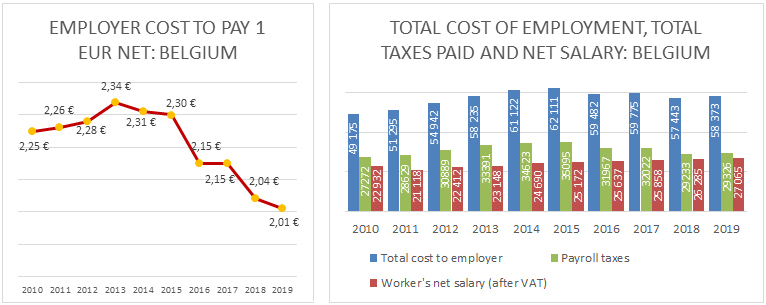Belgian Workers Still Among Europe’s Highest-Taxed
Brussels, 18 July 2019 – Belgian workers will celebrate their “Tax Liberation Day” today, 24 days earlier than they did in 2013 (August 8th). The French and Austrians must work 4 additional days to earn enough for their taxes, according to the upcoming publication of 10th edition of The Tax Burden of Typical Workers in the EU.
Using a consistent methodology across all countries, the data reflect the tax realities experienced by real, working people. 2019’s Tax Liberation Days are as follows:

The continuing implementation of the Michel government’s “tax shift” have significantly reduced the cost of hiring employees in Belgium (where unemployment is at its lowest rate since the inception of the study), however they have had little impact on workers’ buying power.

Key findings – Belgium
- After being the most expensive employees in the EU for several years, Belgians are now the 5th-most expensive to hire (after Luxembourgers, Austrians, the Dutch, and Germans) – yet Belgians still rank 9th in take-home pay.
- An employer in Belgium spends 2.01€ for a typical worker to net 1€ after taxes – down from a peak of 2.34€ in 2013.
- A Belgian employee’s “real tax rate” (including VAT) is now 53.6%, compared to an EU average of 44.5%
- The Belgian government collects 29,326€ from a typical Belgian worker’s wages (before VAT) – the 2nd highest figure in Europe – yet it does not deliver services at this level. Among EU countries, Belgium ranks:
- 5th in the 2017 Health Consumer Powerhouse rankings of health care systems
- 10th in reading, 9th in Science, and 6th in mathematics in the OECD’s PISA rankings of educational systems
- 11th in the 2018 United Nations’ World Happiness Report
Quote from co-author James Rogers:
“The ‘tax shift’ has had a positive impact on the Belgian economy and its people: unemployment is down, and disposable income is on the rise. Still, Belgians are paying too much for their government: Many of our neighbours in Europe are paying lower taxes while scoring higher in health care, education and well-being.”
“Tax Liberation Day” is the calendar day on which a worker theoretically stops working to pay taxes to the state and begins to keep his/her earnings. The data in the calendar reflect the reality experienced by real, working people in the European Union and the true cost of hiring employees in each state.
The study, by James Rogers and Cécile Philippe of Institut économique Molinari, uses OECD and national statistics office salary figures for as a baseline. Payroll tax calculations are made by EY.
Note to editors: The Institut économique Molinari (IEM) is an independent, non-profit research and educational organization. Its mission is to promote an economic approach to the study of public policy issues by offering innovative solutions that foster prosperity for all.
For more information please contact the authors of the study:
James Rogers
Research Fellow-Institut économique Molinari
james@institutmolinari.org
+ 32 497 946 840
Cécile Philippe
Director – Institut économique Molinari
cecile@institutmolinari.org
+33 678 869 858





